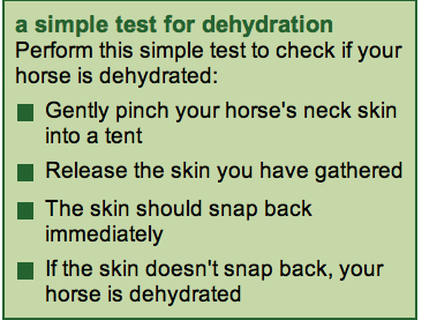The Importance of Water:
Water is the most critical nutrient for horses, as it is essential for health body function and easily lost through sweating, urination and deification... A horse's body weight is comprised primarily of water (65-75% depending on age and condition). Two thirds of this water is contained within the cells, while the final third is extra cellular and therefore found in the plasma and digestive tract. It is important a horse have constant access to clean, fresh water. Horses will avoid water this tastes or smells funny and can dehydrate quickly. So make sure that you check water sources regularly for dirt, debris, hay, manure, algae build-up or even dead animals. Clean buckets with a bristle brush before refilling. It is important to change water often instead of just tapping off, even if it appears fairly clean. This is because water will become stale as it absorbs ammonia from the atmosphere. On average, a horse will consume 5-10 gallons of water a day. However this amount can vary greatly and water is therefore best given free-choice. There are two primary reasons horses require so much water: for health digestion and because they rely on sweating to cool down. A horse's naturally high fiber diet requires a lot of water to keep this fiber moving smoothing through the intestines. This is especially important for domesticated horses which often eat more dry hay than fresh, moist grass. Dehydration can lead to impaction and therefore colic, a very dangerous medical concern for horses.
Functions of Water in The Body
|
Factors Affecting Water Intake
|
|


